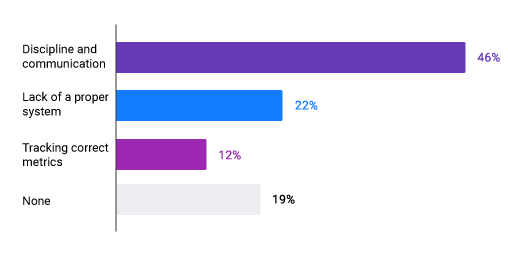This is part three from a series of insights drawn from 50 in-depth interviews taken over the past two years and 126 responses to a survey we sent out recently. The focus is startup reporting: challenges and insights.To better understand our process and the methodology behind these findings, make sure to read Disciplined Accelerator: Introduction.
Findings on challenges startups and accelerators have with reporting
- Collecting data from startups takes up a lot of time and energy. There are no proper incentives that are strong enough to keep founders from moving on to their next stages of their startup journey, leaving accelerators stranded.
- 42% of all accelerators struggle with startup reporting. 30% face this issue mostly after the program ends. 28% deal with it both during and after the program.

- There is a strong connection between the number of startups each accelerator takes per program and the number of accelerators mentioned reporting as a main challenge. Half of the accelerators which accept fewer than 20 startups/program have mentioned no problem with reporting, while 60% of accelerators that take in from 30 to over 100 startups/program mentioned having this issue.
- Startup reporting issues are considered to be caused by lack of a proper system to collect metrics, knowing the correct metrics to track for each type of startup based on their business model and the stage they are at, and a lack of discipline from founders that fail to comply with this request.
 Thoughts
Thoughts
- Most founders are talented business or technical professionals, but lack of skill is not among the top causes of startup failure. Execution capabilities are, and most often these are caused by the lack of internal accountability processes and systems. The role of an accelerator is also to help a startup get better at execution. Reporting is an essential part of accountability (not only external—to the accelerator), but also internal (between team members).
- Therefore, reporting discipline should start during the acceleration/incubation program and should be enforced through the acceleration contract/agreement. Regardless of whether the accelerator has invested cash in the company, reporting should be treated as a main priority in building execution excellence.
“Startups are so focused on the next challenge, reporting metrics falls behind on the priority list.”
— Matthew Forman, Portland State Business Accelerator
- Accountability should be first understood, then enforced. Startup reporting is a form of reflection/focus that is essential in building a healthy, functional company. Lack of reflection, focus or prioritization does not only cause potential issues between startup and accelerator/investors but also within the founding or extended team. This symptom is often correlated with a lack of accountability within the team.
Try a better deal flow tool
- CRM created for accelerators and investors.
- Collaborate with your team and judges.
- All messaging in one place, and more...